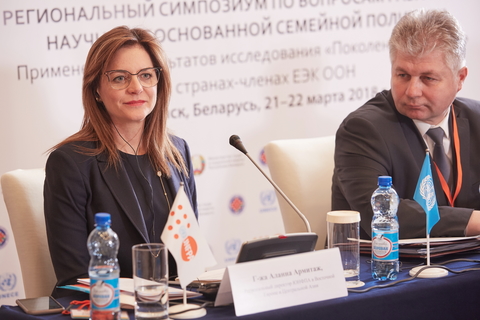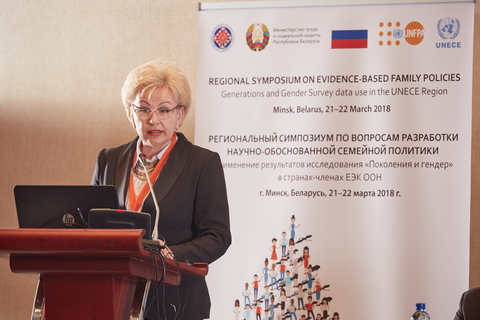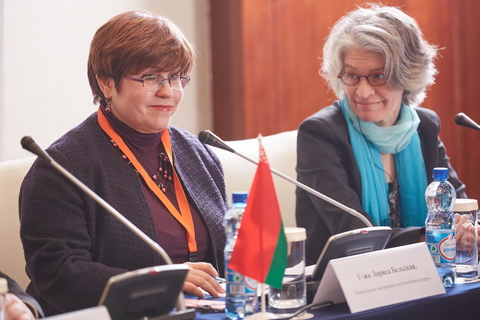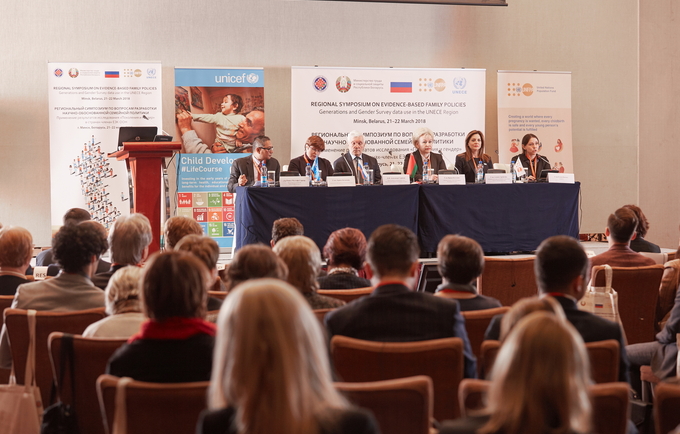On March 21-22, a Regional Symposium on the development of evidence-based family policy was held in Minsk with the participation of foreign experts. The interim data of the international comparative study "Generations and Gender" was voiced at it, which in the future will contribute to the improvement of the family policy in Belarus. The symposium was organized by UNFPA, UNECE, Government of the Republic of Belarus.
The central themes of the symposium's discussions were common challenges for UNECE member countries: low fertility, the gap between reproductive intentions and actual behavior, demographic aging of the society, the realization of a favorable balance of work and family life.

"Many countries in the region are concerned about the impact of these trends on the economy, infrastructure, social systems and even national security," said Alanna Armitage, UNFPA Regional Director for Eastern Europe and Central Asia. "But there is no reason for panic, because we know that the changes that we face in the region are manageable. And the symposium is intended to help improve the management of population dynamics based on the use of data and the results of research on demographic trends in the policy-making process. "
Understanding these problems and developing a scientifically sound family policy that can help in resolving these issues is important both from the point of view of individuals and families, and from the point of view of governments.

"The measures taken earlier cause the addictive effect and no longer have a stimulating effect on the reproductive situation," said Irina Kostevich, Minister of Labor and Social Protection of the Republic of Belarus. - In modern conditions strengthening of the family institution, creation of favorable conditions for the birth and upbringing of children is a strategic task for our country. At the same time, in order to move forward, it is necessary to understand what processes are taking place in the modern Belarusian family, how reproductive attitudes are changing. Possessing scientific knowledge on this matter, it is possible to develop an adequate family policy ".

"The family as a whole should be at the center of attention of national policy makers. People who make decisions need to know how to support family values, how to invest in the family and its development. The interests of individualities in the family are brought together, and all of them must be taken into account, "said Larisa Belskaya, the head of the main department of multilateral diplomacy of the Ministry of Foreign Affairs of the Republic of Belarus. - The society is changing, the approaches to family formation among young people are also changing, as are the economic conditions in the region. The research carried out in Belarus provides a unique opportunity to look at the issues of forming a family institution comprehensively, through the eyes of the people themselves, and to find solutions to existing problems. "
The symposium marked the completion of a three-year international technical assistance project "Support to the National Demographic Security Program of the Republic of Belarus", funded by the Government of the Russian Federation, the United Nations Population Fund (UNFPA) and the United Nations Children's Fund (UNICEF). The national executive agency of the project is the Ministry of Labor and Social Protection of the Republic of Belarus.
The international symposium was attended by internationally recognized experts in the field of demography Tomas Sobotka and Anna Matsyak (Vienna Institute for Demographic Studies, Academy of Sciences of Austria), Irina Kalabikhina (Head of the Department of Population of the Economics Department of the Moscow Lomonosov State University, UN expert), Vladimir Arkhangelsky (Moscow State University ), Sergei Zakharov (Higher School of Economics, Moscow), Alexander Sidorenko, (Senior Adviser, European Center for Social Welfare Policy and Research), Anna Gauthier (Netherlands Interdisciplinary Demographic Institute).
The symposium helped to strengthen the links between representatives of the scientific community, policy and policy makers in the region of countries, members of the United Nations Economic Commission for Europe, discussed the most effective approaches to developing comprehensive policies that create an enabling environment for the formation of families that meet the diverse needs and life situations of women and men , allowing them to earn a living and realize their life goals.
One of the main areas of the discussion was the effective use of these large-scale survey "Belarus: family structure, family relations, fertility in changing socio-economic conditions", held in Belarus in May-November 2017 on the basis of the international methodology of the Generations and Gender Program (GGP ). The poll was conducted by the Center for Sociological and Political Studies of the Belarusian State University in close contact with the coordinating center of the Generations and Gender program in May-November 2017 in 56 cities and 40 village councils of all regions of the country. The address base is provided by the National Statistical Committee of the Republic of Belarus. During field work, 10,000 people aged between 18 and 79 were interviewed.
It is expected that the analysis of the research results will contribute to the improvement of the scientifically based demographic policy in the Republic of Belarus




